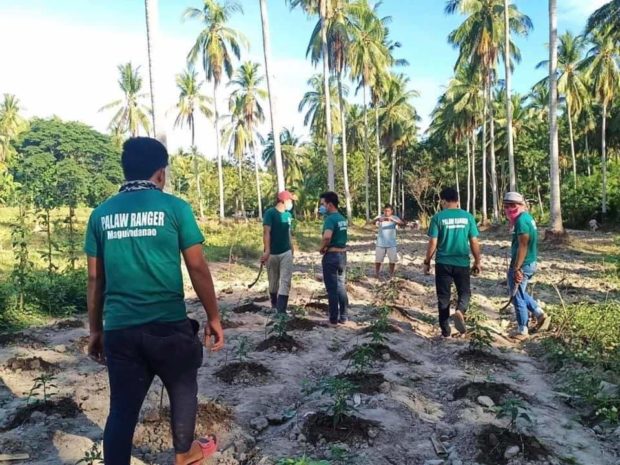
FOOD SECURITY Former combatants of the Moro Islamic Liberation Front are now at the forefront of helping ensure food security in the Bangsamoro region through the survival gardens they cultivate.—PHOTO COURTESY OF THE BARMM ENVIRONMENT MINISTRY
The Bangsamoro Autonomous Region in Muslim Mindanao (BARMM) is one of the wealthiest in the Philippines in terms of natural resources. An “Eden’ on Earth—the region boasts of hydroelectric power from Lake Lanao; plentiful banana, coconuts, mangosteen, and durian plantations; fish and seaweed from the oceans; and mineral treasures in the form of basalt, chromite, manganese, gold, silver and copper.
Unfortunately, people are historically more challenged in “Eden-like” environments. Violent conflict has, for decades, prevented the sustainable and inclusive utilization of these resources, and damaged businesses, the environment, and the region’s export potential. Nevertheless, the region has also had a taste of sustained growth since 2016 and has contributed to the positive economic performance of the Philippines until the COVID 19 outbreak.
The signing of a peace deal between the Philippines and the Moro Islamic Liberation Front (MILF) in 2014, the subsequent approval of the Bangsamoro Organic Law by the Congress in 2018, and the establishment of the Bangsamoro Transition Authority in 2019 have aided growth. However, the region’s full potential cannot be realized unless its current leaders—former revolutionaries from the major Moro armed groups—implement an inclusive vision for peace and sustainable development.
Experience from other peace processes shows that revolutionary groups that have prepared for governance—the ANC in South Africa, the FMLN in El Salvador, and the GAM in Aceh—have done well in guiding post-conflict transitions.
Bearing this in mind, the United Nations Development Programme (UNDP) is supporting BARMM to implement the School for Peace and Democracy (SPD), modeled after a similar initiative in Aceh which was witnessed by the MILF leadership on an exchange visit to Indonesia.
The SPD, launched in 2020, is currently providing MILF commanders and community leaders an opportunity to play civilian leadership roles. SPD-BARMM is premised on a simple principle: The transformation from armed struggle to civilian leadership is ultimately that of the mind. And the mind responds best to what it is familiar with and trusts.
SPD’s core faculty is therefore drawn from among MILF’s own leaders. Initially trained with the support of SPD-Aceh, they have led the development of the curriculum that they now impart to their peers, including skills in effective leadership, conflict management, the role of Islamic values in a pluralist society, and community development. 54 men and 5 women have been trained to in turn train their peers to be leaders. It is our vision to see these numbers increase in the future.
As indicated in testimonials, this cathartic experience equips participants to appreciate their past struggles for social justice and empowerment, and to see themselves as continuing these struggles through peaceful means. For those who were heroes to their communities but enemies of the state for the longest time, it provides a profound moment of transition. Instead of seeing themselves as being disarmed and left to drift, they now see themselves as being armed in a different way to continue a new struggle for peace and democracy.
The SPD will eventually be a program at the Development Academy of Bangsamoro. In the interim, visionaries among the BARMM government, especially the interim chief minister, and development partners—Australia in particular—have assisted with its inception and its initial work, as has the Office of the Presidential Advisor to the Peace Process.
The success of the SPD should establish that intangibles such as self-worth, a deeper cause and meaning, empowerment, and greater social cohesion are as central to lasting peace and sustainable development as the more conventional measures of growth.
We often refer to “unicorns” when speaking of one-of-a kind start-up businesses that hit the proverbial pot of gold. In many ways, the SPD is a “unicorn” experience; it is a unique experiment where former combatants, with their hands free of weapons and their minds freed from violence, find purpose in joining the message of peace, and savoring the richness of diversity in the first breeze of democracy.
Enrico Gaveglia is the UNDP Philippine Officer-in-Charge and Chetan Kumar is the UNDP Philippines Peace Programme Team Leader.